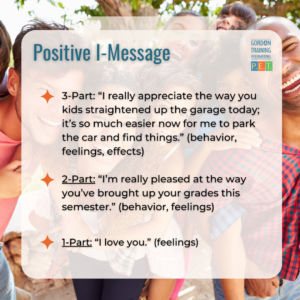Parents often express their positive feelings about their children by praising them. Praise is often motivated by the parent’s intent to reinforce “good” behavior. It is often manipulative and can be destructive to the relationship. Praise is usually a You-Message – a statement about the other person that is judgmental and evaluative.
Children often resent positive You-Messages because they feel they are being judged or talked down to.
Even well-intentioned You-Messages like the following can leave the child with uneasy feelings: “You’re such a good girl!” “You did the right thing by straightening up the garage.” “You’re doing a great job in school.” “You’re always so nice and quiet.”
A Positive I-Message is an alternative to praise. It is an I-Messa ge that can do much to strengthen relationships when there is no problem. A Positive I-Message conveys positive feelings and describes positive tangible effects that another’s behavior has on you.
ge that can do much to strengthen relationships when there is no problem. A Positive I-Message conveys positive feelings and describes positive tangible effects that another’s behavior has on you.
Your child behaves many times in ways that are very acceptable to you – in ways that you like, appreciate, feel pleased about and grateful for. As a parent, you can feel good about yourself after sharing your positive feelings and most importantly the child can feel appreciated, affirmed and loved.
- 3-Part: “I really appreciate the way you kids straightened up the garage today; it’s so much easier now for me to park the car and find things.” (behavior, feelings, effects)
- 2-Part: “I’m really pleased at the way you’ve brought up your grades this semester.” (behavior, feelings)
- 1-Part: “I love you.” (feelings)
A Positive I-Message avoids evaluation or judgment of the child. It focuses on the parent’s feelings and experiences. A Positive I-Message should be a natural, spontaneous expression. Such expressions should not be used to manipulate or bribe the child to do your will, e.g. “I just love you so much when you do what I say.”

